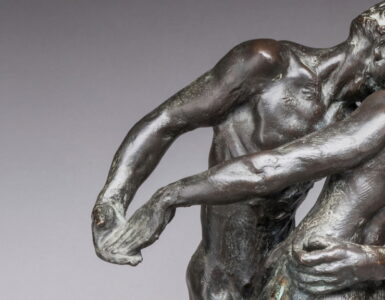For most of its running time, Violeta Went to Heaven plays out as an engaging although not quite intimate biopic – an illuminative portrait of Chilean singer and artist Violeta Parra (Francisca Gavilán), whose music voiced the poetry and anguish of her nation’s poor. Not always crystal clear, the film begins with Violeta’s childhood and ends with her death – but in between takes liberties with characters and chronology, juxtaposing, for example, a pilgrimage across Chile (to gather and archive traditional folk songs), with sojourns in Europe, and then again with a birthday party among friends, an occasion when she meets flautist Gilbert Favre (Thomas Durand), the love of her life. Towards the end, it shifts away from its arm’s length storytelling to plumb the interior landscape of this unique and complex woman.
Writer Eliseo Altunaga frames the story with an interview of Parra by a snide, reluctantly deferential television host, who asks pointed questions about Parra’s connections with communism, and whose buttoned-up smugness absolutely defines what Parra is not. A woman of the people, Parra grew up dirt-poor in a small village, singing in the streets to help support the family after her alcoholic father (Christian Quevedo) – a musician who taught her to play the guitar – died young. One of the film’s recurrent images is of Violeta as a child (Francisca Durán) hungrily devouring wild berries, the dark purple juice surrounding her mouth and streaming down her chin. For a while the singer traveled with a troupe of itinerant entertainers before striking out on her own to sing protest songs about the conditions of workers. Later she left her three children behind with their father – who subsequently disappears from the film’s narrative – and accepted an invitation to perform in Poland, then a Soviet regime.
Much of the film’s strength derives from Gavilán’s intense performance. With her composed face but burning eyes, Gavilán’s Parra knows what she wants and what she believes; she’s not afraid to march into the Louvre with her art and ask to be exhibited, or to call a snooty French patrician a “deaf shithead” when he directs her to the kitchen after her performance. Gavilán is even more compelling depicting the painful personal junctures in Parra’s life, such as when, while in Europe, she receives news of the death of her baby girl, or after her lover ups and leaves, repelled by the harsh words for him she cannot check. In each case, the performer’s fireworks radiate from within.
Based loosely on a biography written by Angel Parra, Violeta’s son, Violeta Went to Heaven takes its time. A trek across the desert to track down an indigenous artist (who, when found, is deaf to her pleas to share his music) isn’t packed with high drama. And the humor is sparse. What the film does have is poetry – Parra’s sayings and songs – and a sense of authenticity. It’s like a travelogue, through the titled character’s eyes, into a cruelly impoverished but ultimately more honest and vital world.
Violeta Went to Heaven
110 minutes. In theaters in L.A. April 19 2013.
Now playing at the Laemmle Royal and Playhouse 7.
Review by Deborah Klugman.








Hey guys, im very interested in your post.. great job